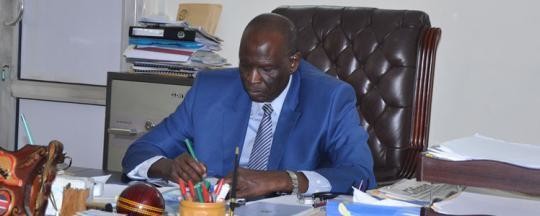South Sudan’s central bank has formed a committee to study the possibility of changing the fixed rate between the dollar and the pound. In an interview on Saturday, the bank governor hinted at changing the exchange rate but was non-committal about when and whether this would happen for certain.
The official exchange rate for the dollar affects the availability of dollars and consequently the cost of imported commodities such as food and fuel.
In recent months the street rate for dollars has risen to more than five times the bank rate. South Sudan’s central bank is responsible for regulating commercial banks and forex bureaus. The central bank does not allow them to sell at more than about 3.1 to the dollar. But this policy may change depending on the outcome of ongoing policy discussions.
“We have formed a monetary policy committee comprising monetary experts,” said central bank governor Kornelio Koryom Mayiik in an interview on Saturday.
“They will look at a number of options and they will carry out studies to make recommendations and advice on whether the current policy should be maintained or realign the foreign exchange rate with parallel rate in the money market.”
According to the central bank governor, the current system is open to abuse because of the wide difference between the official rate and the street rate. People with access to dollars at the official rate may choose to sell them at the street rate.
Koryom said, “A harmonization of the foreign exchange is imperative because it would control abuses and improve the efficacy of monetary policy.”
Another policy matter being studied is the rate at which the central bank lends to commercial banks. Koryom hinted that outcome of the study may result in maintaining or increasing the interest policy rate.
When a central bank increases its lending rate this usually leads other banks also to increase their interest rates, which makes borrowing money more expensive overall. Such a policy, which may result in slower economic growth, is adopted by central banks when they are keen to control inflation.
The lending rate would not come down until “inflation expectations are well-anchored,” said the bank governor.
The official stressed that the bank was particularly concerned about the outward shift in the inflation path relative to the forecast of the bank and the ministry of finance and economic planning. “It is true the latest performance of the economy indicates that inflation will continue to remain outside the target band, but is expected to ease gradually if peace prevails.”
Bank policy changes ‘may surprise the markets’
The central bank governor pointed out that changes in the foreign exchange rate and inter-bank lending rate are not anticipated by markets and would come as a surpise. “The increase in policy rate and its associated interest-rate adjustments may surprise the markets because it would be a technical change of policy that almost nobody anticipated,” Koryom said.
In spite of this, Koryom suggested that raising interest rates now is necessary in order to protect the credibility of the bank’s monetary policy. The top official of the bank note the global oversupply of crude oil, resulting in lower prices, has threatened foreign exchange earnings and accretion to external reserves over a longer period than anticipated.
Commenting on the potential impact of a policy change by the central bank to increase its interest rate and harmonise the foreign exchange rate with the black market, Santino Garang, a US-based South Sudanese economist noted, “Ideally, we should expect some rate-hikes for transaction interest rates based on recent inflation figures but more broadly it is very unclear how the market will respond.”
Santino pointed to the country’s relationship to the international community and the implementation of the signed peace agreement as “critical issues” affecting economic and monetary stability.
He expressed concern about the above-normal inflation in the country. “The current level of inflation and the latest inflation expectations remain far above the target band,” he explained.




